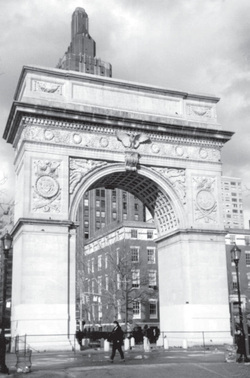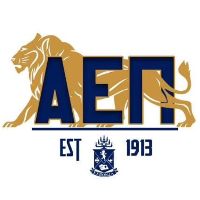History

In the history of the United States, 1913 was an eventful year. Only a year before, Arizona had been admitted to the Union as the forty-eighth state, completing the continental bounds of the country. Woodrow Wilson was inaugurated president, the Federal Reserve System was established to strengthen the banking system; and the Sixteenth Amendment to the Constitution was adopted, providing for the progressive tax on income. In that same year, at the School of Commerce of New York University, Alpha Epsilon Pi officially made its appearance in the fraternity world.
Its founders were all young men of serious purpose, employed during the day, coming from middle class homes, who sought to get ahead by obtaining the formal training offered at New York University in the evening sessions. The catalyst for the founding of Alpha Epsilon Pi was the transfer of Charles C. Moskowitz from the College of the City of New York to New York University’s School of Commerce.
While enrolling at C.C.N.Y., Charles Moskowitz, a fine basketball player, was heavily sought after for his athletic skills. When he enrolled at New York University, his reputation had preceded him, and he was immediately rushed and given a bid by one of the fraternities. However, when Charles Moskowitz asked whether bids could also be extended to his friends, he was immediately told that the bid was for him alone.
Brother Moskowitz had a circle of close Jewish friends that met after work for dinner before going to class. Evidently, Founder Moskowitz discussed this with his friends and they decided that fraternities were good for the students. Since there was no patent on the idea, they would start one of their own. The group had its meals at a German rathskeller on Second Avenue, within walking distance of the university.
The young students talked with the owner who agreed that if six or eight men would eat there regularly every school night, he would give them a private area in the rathskeller. And that is how Alpha Epsilon Pi began.
One of the topics of conversation was fraternity: its pros and cons. Could this non-affluent group of young students, busy with their daytime jobs and nighttime studies, successfully launch a new fraternity when there were already seven well established groups at the School of Commerce, three of them nationals? They decided to try. Brother Moskowitz is quoted as saying, "Our aim was mutual assistance in our intellectual and social life to strengthen the democratic character of student life.”
When the founding group finally jelled, there were eleven founding members: I.M. Glazer, Herman L. Kraus, Arthur M. Lipkint, Benjamin M. Meyer, Hyman Schulman, Emil J. Lustgarten, Arthur E. Leopold, Charles J. Pintel, Maurice Plager, David K. Schafer and Charles C. Moskowitz. Charles Moskowitz was chosen as the first master.
By common consent, the name Alpha Epsilon Pi had been chosen as best representing the ideals the founders wanted to express.
After months of meetings and perfecting the organization, the young group decided it was time to obtain recognition from the university as an official School of Commerce fraternity. To gain recognition, it was decided to address a letter to Dean Joseph French Johnson of the School of Commerce, outlining the aims and ideals of the fledgling fraternity and asking for his consideration and approval.
David K. Schafer was the only member who could type, so he, as secretary, was chosen to draft the request and type it, to give it a businesslike appearance. The letter was submitted, probably about early October, after which the waiting period began. As is the case today, the wheels of the decision makers turned slowly. At last, however, the long awaited reply came on November 7, 1913. It was in the affirmative. Alpha Epsilon Pi was a recognized fraternity at New York University.
It has been over ninety years since Alpha Epsilon Pi began to build its special form of brotherhood. The fraternity has survived four wars, the great depression, several recessions, changes in the standards of morality, and a revolution in personal behavior and conduct. It has seen more changes occur in this time than had occurred in the entire history of the world prior to its founding. It has seen the birth of television, the jet plane, space travel and the computer. Through it all, the fraternity has remained true to the ideals of the founders honesty, courage, brotherhood, love of country and faith in Jewish ethics and values.
If these ideals continue to have meanings in the years to come, then Alpha Epsilon Pi will be able to carry its message to college generations yet unborn. It will have been true to the ideals expressed in the motto emblazoned on its coat of arms, ESPONDA. Recently, Alpha Epsilon Pi celebrated its 100th Anniversary, with about 180 chapters on its chapter roll.
The greatness Alpha Epsilon Pi has achieved is all from the vision of that group of eleven young Jewish men going to night school in pursuit of a better life. Many times a chapter will blame its lack of success in part because of low membership. But one thing that every brother should learn from our history is that Alpha Epsilon Pi started with eleven men, ended the first year with eight due to graduation, and flourished into the fraternity it is today. It is not the numbers that make us great, it is the spirit and motivation to create something unique and the ability to implement a positive program based on Jewish ethics and values.
Its founders were all young men of serious purpose, employed during the day, coming from middle class homes, who sought to get ahead by obtaining the formal training offered at New York University in the evening sessions. The catalyst for the founding of Alpha Epsilon Pi was the transfer of Charles C. Moskowitz from the College of the City of New York to New York University’s School of Commerce.
While enrolling at C.C.N.Y., Charles Moskowitz, a fine basketball player, was heavily sought after for his athletic skills. When he enrolled at New York University, his reputation had preceded him, and he was immediately rushed and given a bid by one of the fraternities. However, when Charles Moskowitz asked whether bids could also be extended to his friends, he was immediately told that the bid was for him alone.
Brother Moskowitz had a circle of close Jewish friends that met after work for dinner before going to class. Evidently, Founder Moskowitz discussed this with his friends and they decided that fraternities were good for the students. Since there was no patent on the idea, they would start one of their own. The group had its meals at a German rathskeller on Second Avenue, within walking distance of the university.
The young students talked with the owner who agreed that if six or eight men would eat there regularly every school night, he would give them a private area in the rathskeller. And that is how Alpha Epsilon Pi began.
One of the topics of conversation was fraternity: its pros and cons. Could this non-affluent group of young students, busy with their daytime jobs and nighttime studies, successfully launch a new fraternity when there were already seven well established groups at the School of Commerce, three of them nationals? They decided to try. Brother Moskowitz is quoted as saying, "Our aim was mutual assistance in our intellectual and social life to strengthen the democratic character of student life.”
When the founding group finally jelled, there were eleven founding members: I.M. Glazer, Herman L. Kraus, Arthur M. Lipkint, Benjamin M. Meyer, Hyman Schulman, Emil J. Lustgarten, Arthur E. Leopold, Charles J. Pintel, Maurice Plager, David K. Schafer and Charles C. Moskowitz. Charles Moskowitz was chosen as the first master.
By common consent, the name Alpha Epsilon Pi had been chosen as best representing the ideals the founders wanted to express.
After months of meetings and perfecting the organization, the young group decided it was time to obtain recognition from the university as an official School of Commerce fraternity. To gain recognition, it was decided to address a letter to Dean Joseph French Johnson of the School of Commerce, outlining the aims and ideals of the fledgling fraternity and asking for his consideration and approval.
David K. Schafer was the only member who could type, so he, as secretary, was chosen to draft the request and type it, to give it a businesslike appearance. The letter was submitted, probably about early October, after which the waiting period began. As is the case today, the wheels of the decision makers turned slowly. At last, however, the long awaited reply came on November 7, 1913. It was in the affirmative. Alpha Epsilon Pi was a recognized fraternity at New York University.
It has been over ninety years since Alpha Epsilon Pi began to build its special form of brotherhood. The fraternity has survived four wars, the great depression, several recessions, changes in the standards of morality, and a revolution in personal behavior and conduct. It has seen more changes occur in this time than had occurred in the entire history of the world prior to its founding. It has seen the birth of television, the jet plane, space travel and the computer. Through it all, the fraternity has remained true to the ideals of the founders honesty, courage, brotherhood, love of country and faith in Jewish ethics and values.
If these ideals continue to have meanings in the years to come, then Alpha Epsilon Pi will be able to carry its message to college generations yet unborn. It will have been true to the ideals expressed in the motto emblazoned on its coat of arms, ESPONDA. Recently, Alpha Epsilon Pi celebrated its 100th Anniversary, with about 180 chapters on its chapter roll.
The greatness Alpha Epsilon Pi has achieved is all from the vision of that group of eleven young Jewish men going to night school in pursuit of a better life. Many times a chapter will blame its lack of success in part because of low membership. But one thing that every brother should learn from our history is that Alpha Epsilon Pi started with eleven men, ended the first year with eight due to graduation, and flourished into the fraternity it is today. It is not the numbers that make us great, it is the spirit and motivation to create something unique and the ability to implement a positive program based on Jewish ethics and values.

